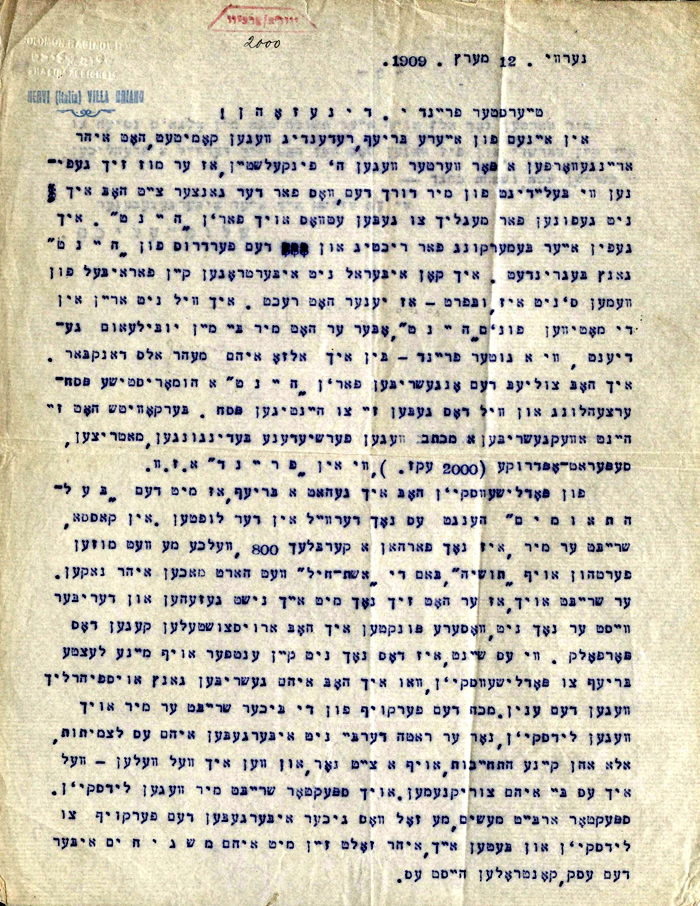From The Abraham Sutzkever-Szmerke Kaczerginski Historical Collection
Series I: Correspondence with individuals, 1836-1941
Sholem Aleichem to Jacob Dinesohn, 1908-1913
YIVO Institute for Jewish Research
Translated from the Yiddish by
Mindy Liberman
Mindy Liberman
This typewritten Yiddish letter from Sholem Aleichem to Jacob Dinezon describes the ongoing negotiations regarding the transfer of Sholem Aleichem’s copyrights in honor of his 25th Jubilee as a writer.

Letter to J. Dinesohn
Nervi, March 12, 1909
Sholem Rabinovich
שלום עליכם
Sholem Aleichem (Embossed)
NERVI (Italia) VILLA BRIAND
(Stamped)
Dearest Friend J. D i n e s o h n!
In one of your letters, speaking about the committee[1], you threw in a few words about Mr. Finkelshteyn[2], that he must find himself insulted by me because, for this whole time, I haven’t found it possible to give something to Haynt as well. I find your remarks just and Haynt’s annoyance altogether well-founded. I can’t endure resentment anywhere, from anyone, no matter whom, and especially—when the other person is right. I don’t want to go into Haynt’s motives, but he served me as a good friend during my Jubilee—therefore, I am even more grateful to him. I have, because of this, written a humorous Passover story for Haynt and will give it to them this Passover. Berkowitz[3] wrote them a letter today about various stipulations, typefaces, offprints (2000 copies) as in “Fraynd” and so on.
I had a letter from Podlichevsky[4] that with the “bal hatoymim”[5], it hangs meanwhile in mid-air. He writes me that there are still 800 rubles in the treasury, which we will have to invest in “Tushiah”[6] in case the “Woman of Valor”[7] will be stubborn. He also writes that he hasn’t met with you and, therefore, doesn’t yet know what points to put forward to the couple. As it appears, there is as yet no answer to my most recent letters to Podlishevsky, where I wrote very exhaustively about the matter. Concerning the sale of the books, he also writes to me about Lidski[8], but at the same time, he advises not to give it to him in perpetuity, but without any commitment, for a time only, and when I will want—I will take it back from him. Spektor[9] also writes me about Lidski. Spektor is doing everything possible so that the sale to Lidski will go through quickly and asks you to act together as mashgiachs[10] in this matter, that is, to supervise it.
We are still waiting for your response concerning my Olga’s trip to you in Warsaw, and in the meantime, have a happy, kosher Passover, and You Shall Rejoice in Your Festival[11]—as your devoted Sholem-Aleichem wishes you
[Handwritten] Also greeting you heartily—I. D. Berkowitz